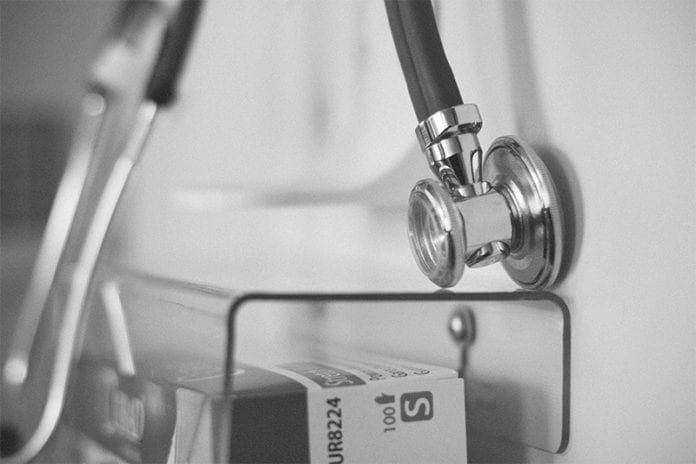Do you disinfect your stethoscope after each use?
A recent study revealed that the contamination level of a stethoscope diaphragm after a single use is “comparable to the contamination of parts of the physician’s dominant hand.” The study also found that the stethoscope tube can become contaminated, too.
Published in the Mayo Clinic Proceedings, the study concludes that stethoscopes may play a part in transferring bacteria from patient to patient, and should be disinfected after each use.
“By considering that stethoscopes are used repeatedly over the course of a day, come directly into contact with patients’ skin, and may harbor several thousands of bacteria (including MRSA) collected during a previous physical examination, we consider them as potentially significant vectors of transmission,” wrote the authors of the study. “Thus, failing to disinfect stethoscopes could constitute a serious patient safety issue akin to omitting hand hygiene.”
Specifically, the study finds that stethoscopes should be cleansed after every clinical use.
“Our findings provide strong evidence of the potential for stethoscope-mediated transmission of microorganisms and the need to systematically disinfect stethoscopes after each use,” the authors of the study wrote.
However, the study did not look at how stethoscopes should be efficiently and safely disinfected after each use, or how this can be done without damaging the stethoscope over time.
What do you think, nurses? Do you disinfect your steth after every use? Do you think doing so would help prevent the transmission of bacteria?


Yes each time after using
Let’s face it. In 35 years of nursing I can’t recall a single time I thought to myself “Whew! Sure am glad I had this top of the line high priced stethescope or else this patient might have ….”. Don’t get me wrong-I’m all for quality equipment. However a great number of patients don’t require the best stethoscope in the world in order for a good nurse to make an assessment. We old fart nurses remember when every patient had their own glass thermometer kept in a vial of disinfectant at the bedside or hanging on the wall! Why not include a disposable stethoscope in each puts admission pack (won’t work for ED) and the nurses can decrease the amount of exposure their better stethoscopes get, thereby requiring less cleaning. And you guys cleaning yours between each use-I commend you for your habit. In the end it’s the bugs that will wipe out the human race (in my humble opinion) so we must do all we can to delay it!
I use a glove. Always available and easy to use. I’m sure some study shows it’s more dangerous than prescribing antibiotics but for now, it works for me.
Every.Single.Time. Yes I do!
I use a cover for each patient. They are easily applied, and thrown away when finished with the patient. I usually disinfect the tubing at the end of the day, but perhaps I need to rethink that.
http://progressivedoctors.com/disposable-stethoscope-cover-stethosleeve/
What is the effect of using the antimicrobial stethoscope condom s? (The ones with the antimicrobial silver molecule)… I understood that that eliminates the need to wipe down with alcohol swab.
The diaphragms do dry out with routine exposure to alcohol… this decreases the amplification of the auscultated sounds
I think that is a great idea but would be hard on the stethoscopes. Maybe stethoscope condoms/plastic covers should be provided in each patient room to be used.